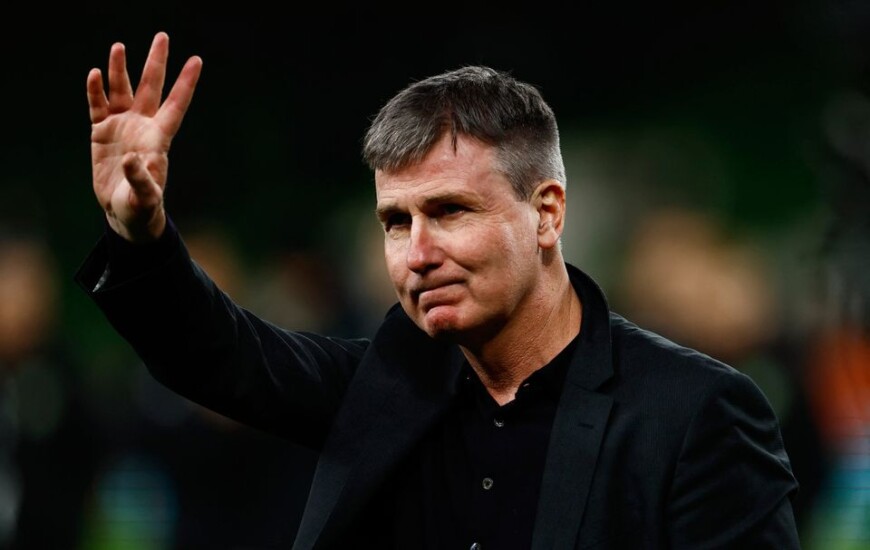The long, slow goodbye of Stephen Kenny
Mike Finnerty 22 Nov 2023
Steve Staunton, all is forgiven.
The 5-2 loss to Cyprus in October 2006 or needing a last-minute winner to beat San Marino in March 2007 served as the previous nadirs of Irish football, but the former Irish captain may be forgiven for thinking a burden has been lifted off his shoulders.
He is no longer the worst Irish manager in history.
That dubious distinction goes to Stephen Kenny, with his regime possibly, finally, mercifully coming to an end following a 1-1 draw against New Zealand and a loss to a Netherlands side that played with all the vigour and passion of a hungover Sunday league 5-a-side team.
When Jack Charlton knew his time was up following Ireland’s failure to qualify for Euro 1996 after losing the qualification play-off to the Netherlands in December 1995, it felt like the end of an era.
The man who brought us so many good times knew his time was up, and with an Anfield crowd effectively doubling as a home match for Ireland, Charlton’s farewell was dignified and honourable.
With Kenny’s farewell, it is more apt to dub it the end of an error.
As Kenny left the dugout at the Aviva, possibly for the final time, on Tuesday evening, he had the expression of a man who knew his number was up.
In a frank, post-game interview, Kenny said “obviously the board are meeting next week, they’ve a decision to make, and I respect whatever that decision is.”
“Of course, it would be a dream to carry on and manage the team, of course I would, my instinct is that it’s not going to happen. I respect that as well.”
The manager who achieved so much within the domestic game seemed like the answer to Ireland’s prayers after the O’Neill era ended in tears and the 2nd McCarthy era merely confused people instead of exciting them.
Kenny took the Irish job in 2020 in the most unusual of circumstances but was given a fairly easy task – beat Slovakia in a play-off, and a spot at the delayed Euro 2020 was ours.
Ireland was just outside the top 30 of the FIFA world rankings at that time, and the building blocks for a solid 2020s were in place.
A Covid-struck Irish squad narrowly lost in a shootout in Bratislava on that October 2020 evening that you would be forgiven for having written off as a Twilight Zone-style vortex of banality.
Considering Ireland would have ended up in the same group as Sweden, Spain and Poland if they managed to qualify for Euro 2020, we may have found out sooner that Kenny was a manager bereft of ideas and this sad affair could have been avoided.
Instead, we will not be getting a sequel to Joxer Goes To Stuttgart next summer, and the focus of the Irish sporting world will turn to the Olympics instead.
Ireland has had the chance to qualify for three major international tournaments – two European Championships and a World Cup – and for our troubles, we’ve merely discovered that Ireland would probably lose to San Marino.
It is easy to act as the Monday morning pundit and claim we would have done things differently if we were in charge, but the other unspoken element of the Kenny regime is the fallout from the John Delaney affair still lingering.
Delaney’s hollowing out of the FAI and subsequent parasitic draining of football infrastructure meant that Ireland could have convinced Sir Alex Ferguson or Carlo Ancelotti to take the Irish job and they would have struggled to get a result.
The youth infrastructure required to sustain a winning international football team simply does not exist in Ireland, and that falls squarely at the feet of Irish football having the life sucked out of it by the Delaney administration.
Kenny knows this better than anyone – he was the under-21 manager before getting the call-up to the top job in Irish football.
Kenny occupied a similar position in Irish football as Kevin Bakhurst does now at RTÉ – both men were given the job of renewing an institution that was on its last legs after years of rot.
There is a school of thought that argues Kenny should have been given the job instead of Mick McCarthy in late 2018, and there is merit to that particular argument.
We would have found out sooner that Kenny’s tactics, or lack thereof, don’t work at an international level.
Following the debacle of Euro 2000, German football authorities made it a mission to make sure an embarrassment on that scale never happened again, and the nation’s best young players were to be given the football facilities they needed to prosper.
That experiment beared fruit with the triumphant 2014 World Cup squad.
Subsequent calamities in German football have focused on a sense of complacency and arrogance setting in within German football, and what has happened with Germany is a reminder that incompetence can happen even at the highest levels of international football.
The legendary 1990s documentary An Impossible Job showed former England manager Graham Taylor and the pressure he was under as he failed to get England to the 1994 World Cup, and it is easy to see Kenny as a parallel to Taylor.
Both are affable, likeable managers who weren’t exactly the most tactically astute managers to ever tread a touchline, and persisted with starting players that were blatantly out of their depth at the international level (yes, we’re saying James McClean is our Carlton Palmer.)
Both men were handed an impossible task, and were put under the spotlight of an unrelenting media that put every mistake, every piece of body language, and every starting line-up under the harshest of microscopes.
Kenny is the Jack Lemmon of football managers; he is a dogged good guy who never had a decision go his way, and proof that nice guys always finish last.
There are numerous games in the Kenny era where heroic defeats were treated like the end of Cool Runnings – those plucky underdogs came so close to pulling it off but the other side had more money, talent and equipment at their disposal.
Kenny will in all likelihood leave the Irish job with a win rate of 27.5%, but some will note there were some heroic losses in those 17 losses.
The narrow 2-1 defeat away in Portugal in September 2021 or the 1-0 loss to France at the Aviva earlier this year offered a glimpse into a future where Ireland are good enough to qualify for major tournaments and subsequently get outclassed by superior opponents ala Euro 2012.
Among those 17 losses is the absolute rock bottom of Irish football, the 1-0 loss to Luxembourg in March 2021.
There is no point relitigating that particular chapter in Irish football history, but suffice it to say that Kenny was quickly castigated in the court of public opinion.
At that stage, death by a thousand cuts was ensured.
Ireland sit at 58th in the world rankings, with the rankings likely to drop even further in the next round of updates, leaving Ireland languishing behind footballing powerhouses such as Burkina Faso and Saudi Arabia.
History may rehabilitate Kenny, with his penchant for granting debut to young players the one part of his legacy that can never be taken away from him, but that may well result in Kenny being a pub quiz question as opposed to a titan of Irish footballing history.
Should Evan Ferguson prove to be the heir to Robbie Keane’s throne, people won’t remember that it was Kenny who gave him his debut to begin with.
Football fans may know that David Beckham became the England captain in 2000, but no one can actually recall that Howard Wilkinson was the manager.
The juggernauts of Albania are topping their qualification group for the European Championships, and Ireland will be content to stay at home for another tournament.
In the aftermath, the soul-searching will begin anew.
Names like Gus Poyet and Roy Keane have been floated as the answer to our problems, and there is an interest in Irish domestic football at a level not seen in decades.
Kenny will discover his fate at an upcoming board meeting of the FAI, but they may as well stop delaying the inevitable and put Kenny out of his misery now.
The show is over, the curtains have closed, and the cleaners are sweeping the floor.
Stephen Kenny will go down in Irish football history, but perhaps not for the reasons he expects or deserves.
2023 will be remembered as an annus horribilis for Irish football on the international stage, both at a male and female level.
A year that promised so much has ended in a debacle.











